
JPMorgan Chase Chairman and CEO Jamie Dimon testifies during a US House Financial Services Committee hearing on Capitol Hill in Washington, DC, June 19, 2012, about JPMorgan Chase’s trading loss.
- JPMorgan CEO Jamie Dimon argued that a plan to move the tax rate U.S. companies pay on foreign profits to 21% could, over time, push firms to shift business overseas.
- That move could accelerate if allies renege on their promises to impose a similar global minimum tax rate, he said.
- President Joe Biden's administration wants to tax U.S. companies' foreign profits at 21% and their domestic earnings at 28%.
- Citigroup CEO Jane Fraser concurred, adding that "it's very hard to get other countries to sign on to an equivalent program despite some optimism."
JPMorgan Chase CEO Jamie Dimon and Citigroup chief Jane Fraser on Thursday expressed concerns over President Joe Biden's effort to hike the amount of taxes businesses pay on foreign profits and a concurrent goal to set a global minimum corporate tax rate.
Watch NBC6 free wherever you are
Testifying before the House Financial Services Committee, Dimon argued that a plan to raise the U.S. tax rate on foreign profits to 21% could, over time, push firms to move business overseas. Dimon thinks that shift could accelerate if allies renege on their promises to impose a similar global minimum tax rate.
"America would be the only country, I think, in the world that would have what we call a global tax rate," he said, referring to the proposed 21% rate on U.S. companies' foreign income.
Get local news you need to know to start your day with NBC 6's News Headlines newsletter.
"There's no question in my mind that, at the margin ... that will drive capital and, eventually, brains and R&D and investment overseas," he said. "And that would be a mistake for America."
Fraser, Citigroup's new CEO, concurred, adding that "it's very hard to get other countries to sign on to an equivalent program despite some optimism."
"I think that will be extremely difficult," she continued. "And, therefore, it could put the U.S. in a position of being less competitive around the world."
Local
The commentary from two of the nation's top bankers came as the Biden administration continued to seek international support for a global minimum corporate tax rate of 15%.
The Treasury Department, which has taken the lead in trying to persuade Germany, France and others to back the plan, contends that a universal floor on corporate tax rates would allow governments to more effectively generate tax revenue.
Neither the White House nor the Treasury Department wished to comment on the record.
The current system, according to Treasury Secretary Janet Yellen, incentives countries to offer lower effective corporate rates over time in a "race to the bottom" to lure corporations across geographies.
But Dimon and others have expressed doubts over any chance of long-term success in persuading U.S. peers to adhere to a global minimum at 15% or any other level, especially when it may be more lucrative for governments to cheat the system by offering backdoor incentives or flouting the agreement entirely.
A JPMorgan spokesperson explained that the concern is that the U.S. would adopt a relatively high tax on foreign income, at 21%, only for foreign partners to shirk their own tax promises. That scenario could put the U.S. at a competitive disadvantage and encourage the offshoring of factories, profits and workers.
The Treasury Department has reiterated that the 15% proposal should be thought of as a sort-of floor and that subsequent talks could eventually push it higher. That, in theory, could work to reduce a tax disadvantage.
That the White House is keen to coax others into a global minimum tax isn't necessarily a surprise given the amount of spending it wants to see to achieve its agenda priorities.
Its American Jobs Plan, an infrastructure-focused proposal, would funnel $2.3 trillion over a decade into traditional infrastructure as well as toward scientific innovation, pay for home health aides and the construction of 500,000 electric-vehicle charging stations.
The GOP countered with its own version Thursday, a more modest $928 billion proposal with a greater emphasis on "hard" infrastructure like roads, bridges and public transit.
The White House also hopes to enact the American Families Plan, a $1.8 trillion piece of legislation aimed at funding for social programs like paid family leave, free early childhood education and free community college.
Biden's economic team says its Made In America tax plan would help cover the costs of both bills. Broadly, that tax plan seeks fortify the IRS and crack down on tax evasion, raise the amount the wealthiest households pay on capital gains, and hike the rate U.S. businesses pay on domestic profits to 28%.
President Donald Trump's 2017 tax cuts reduced the U.S. corporate tax rate to 21% from 35%.
The bank CEOs appeared on Wednesday before the U.S. Senate Committee on Banking, Housing and Urban Affairs.
One testy exchange from that hearing came between Sen. Elizabeth Warren, D-Mass., and Dimon. Warren accused JPMorgan Chase, and the other consumer banks, of not doing enough to communicate to its customers about relaxation of certain overdraft fee rules during the coronavirus outbreak.
Dimon countered that the bank had accommodated customers who had made qualifying overdraft fee waiver requests and that the bank would not be refunding billions it collected in such fees in 2020.



